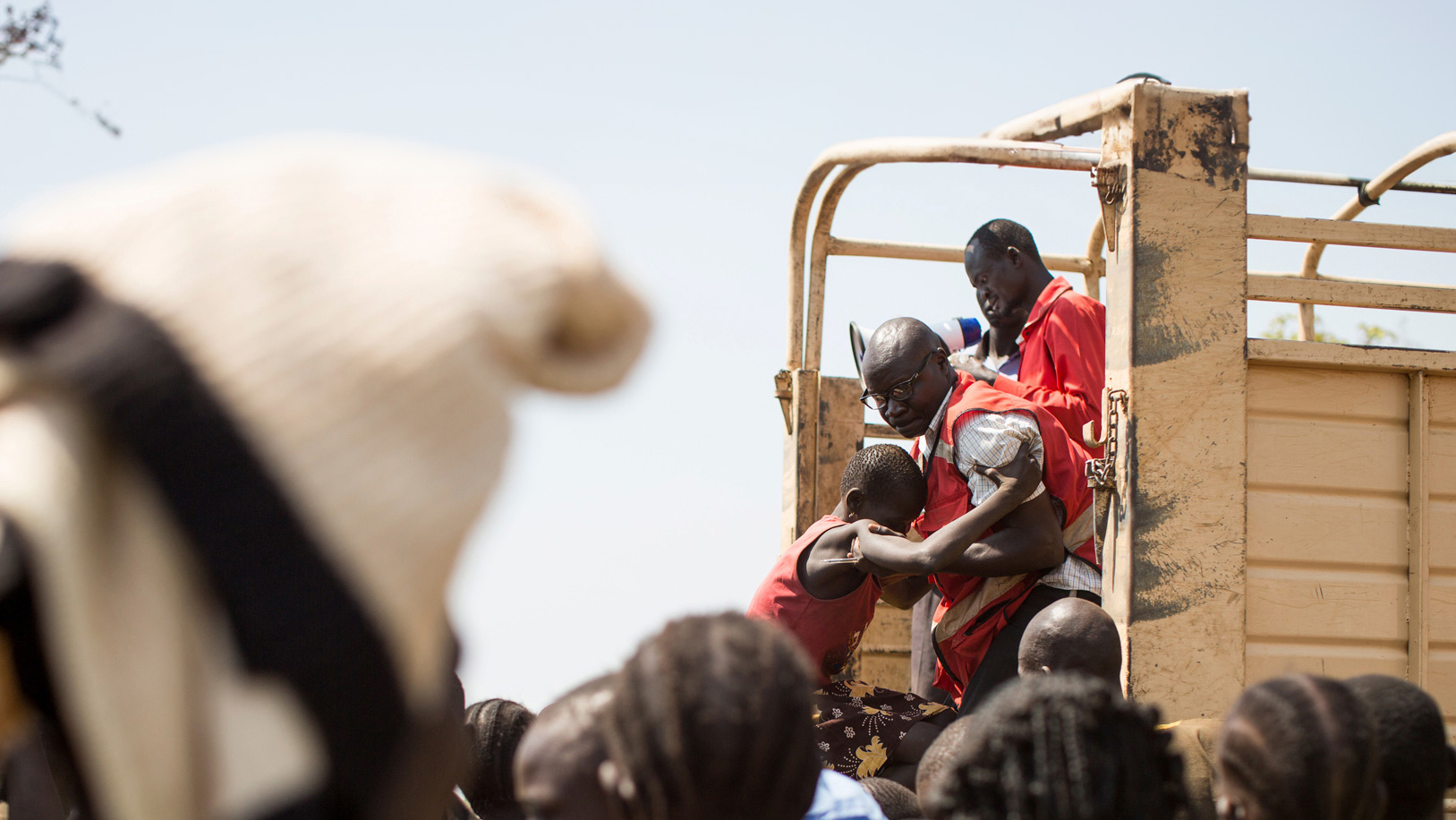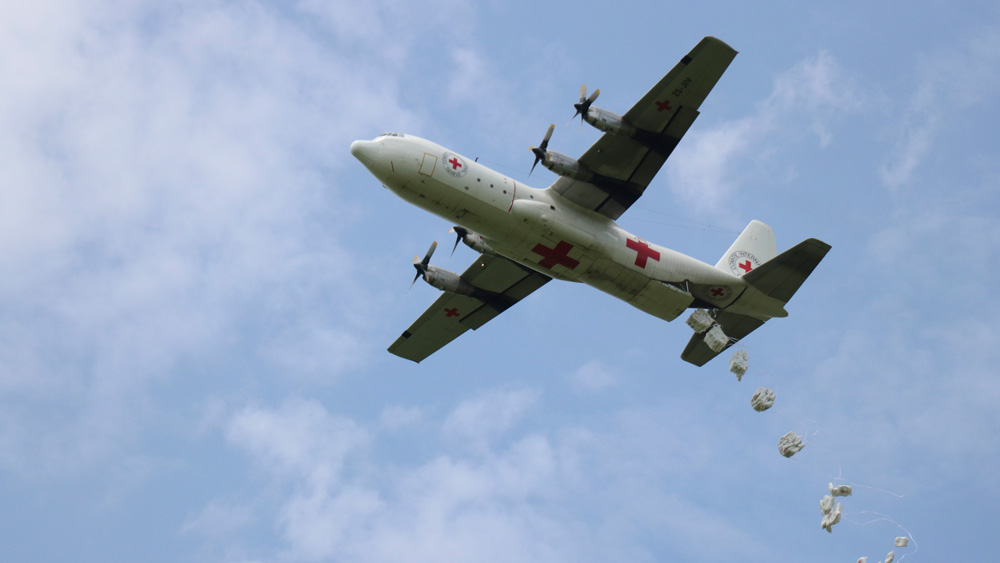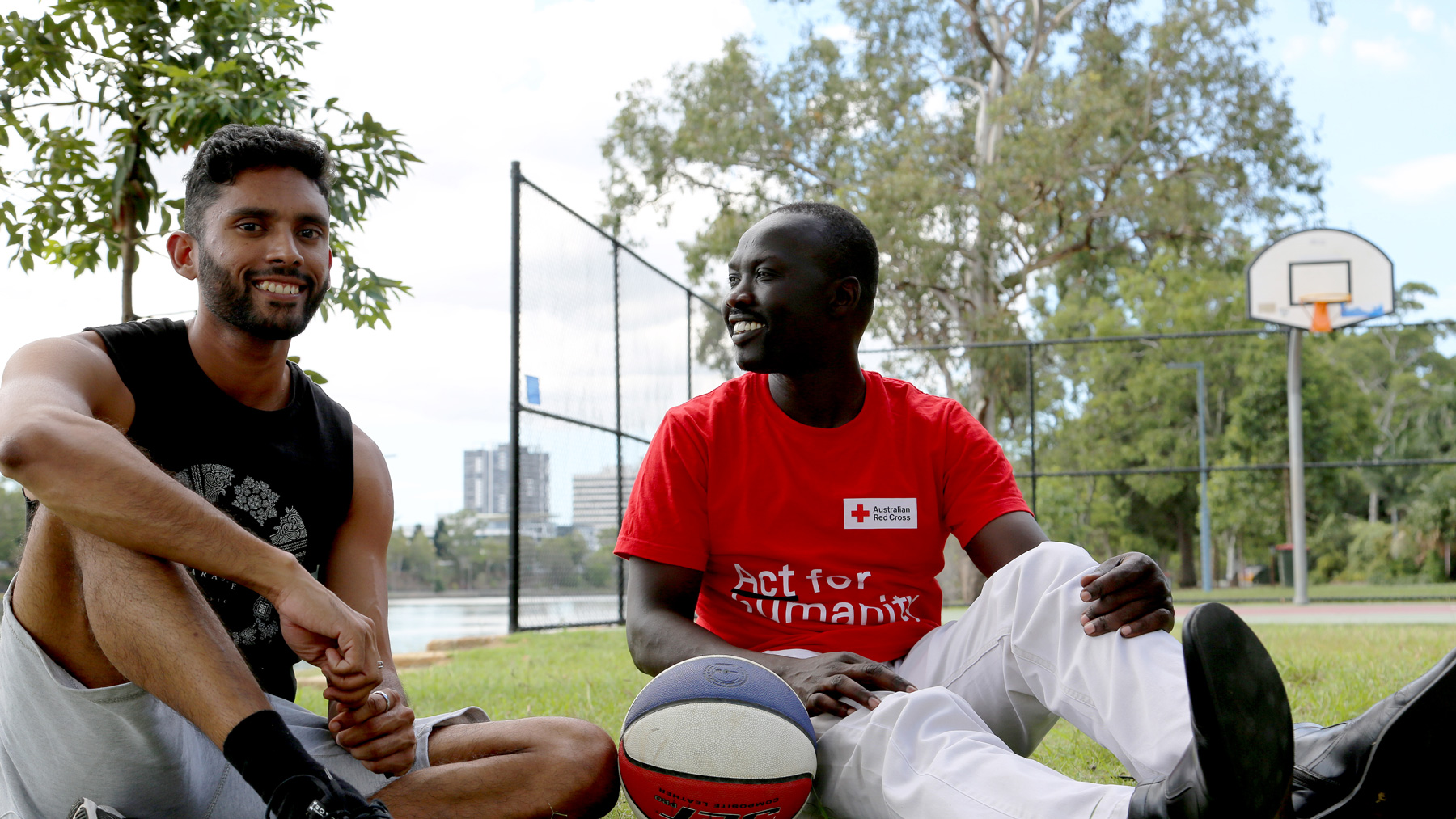Elijah's story [long]
I was born in the middle of a war.
“I am with you on this journey. I hear you. I understand your issues. You are not alone.”

By Elijah Buol OAM, Queensland State Lead, Migration Support Programs
My childhood was filled with the sound of gunfire, and bombs dropped from planes roaring across the sky. It was haunted by stories of neighbours, friends, and loved ones abducted, missing or killed. It was a fight to survive among horrors a child should never know.
I was born in 1985 in a country now known as South Sudan, during a long civil war for independence. That conflict took my mum when I was six and my dad when I was nine. I spent eight years alone in a refugee camp.
Day after day, the headlines shout of another conflict, disaster, or climate crisis. But behind the commentary are the stories you don’t much see. They are the stories of what becomes of those caught in the middle. The real people with families, homes, hopes and dreams.
I am one of those people. This is my life story and how I become one of the Red Cross helpers. And it’s a story that shows that when we help each other, the world can be a better place.
Today, I’m in charge of a team of Red Cross helpers who support those looking for safety in Australia, the country that gave me a home when I was 16. Every day, we help people who have nowhere else to turn.
The scars that never leave you
My parents, Agaw Alier and Buol Deng, were cattle keepers and farmers.
My mother was a very strong religious woman in the Anglican Church of Sudan, and my father was a respected leader in our clan of Biong. He was a very courageous man and activist at an early age. Through his advocacy and stand against British Colonial activities, he earned the nickname Matungchar. It means 'black horn' in Dinka and refers to a powerful Anglo-Egyptian Sudan Army condominium of the United Kingdom; they used to wear blacked-horned helmets.
Mum and Dad raised our family in a village called Biong- Makolcuei Boma near the city of Bor, not far from the White Nile River.
By the time I arrived – the middle child of five – the second civil war had begun.
When it ended 20 years later, it would become Africa’s longest conflict. Some two million people died in that war or from the famine and disease it caused. While four million were displaced from their homes, often over and over again.
I belong to a generation born into war, lives marked forever by loss, destruction, and poverty. We did not know safety nor stability, only fear. The scars and trauma of a childhood like that are the kind that never leaves you.
I remember the last day I had with my mum. She went into town for groceries. Witnesses say she got caught in the crossfire between government and rebel groups. We never saw her again. After she died, my four sisters were sent north to live with an aunt while I stayed behind with dad. It would be two decades before I saw my siblings again.
Dad was part of the struggle for independence, and as things got more dangerous, he decided it was best for me to leave, too.
We did not know we were saying goodbye forever.
We had no way to stay in touch, and two years later, I received a Red Cross Message with news of his death. I’ve never learnt for sure what happened, but many people believe he was shot or died of a gun wound.
My dad organised for an older cousin to escort me to Uganda. For three months, we walked to the border, surviving with very little food or water, surrounded by thousands of desperate, hopeful people also trying to escape.
Once we got to the safety of a refugee camp, my cousin left and turned to walk back home to her own children. I was seven years old. And I was alone.
The first time ever I felt safe
At the refugee camp, I was given a tent and an identity card for food. I was placed with six other southern Sudanese boys who like me had come without family.
Together, we built a house of grass and branches to protect ourselves from the rain and wild animals, and we planted seeds to grow extra food. The camp had teachers and books, and we went to school under the trees. That made me happy. My mum had always told me how important education was, but the conflict meant I hadn’t been to school for years.
Slowly, the older boys took on the role of parents, and we became a kind of new family to each other. I missed my real family a lot. But I could no longer hear gunfire.
And for the very first time in my life, I felt safe.
I could not say living in such a place was good, but it was not bad either. There was just enough food to survive, and the adults in the camp helped us. You meet many different people in a refugee camp. Sometimes you don’t speak the same language, but that feeling of security creates a bond.
Uganda hosts more refugees than any other African country and is currently home to more than 1.5 million. And like in South Sudan, I saw Red Cross people helping. Today, in camps across the country, they support in many ways. They provide clean and safe water, hygiene and sanitation facilities, necessities like blankets and tarps, and psychosocial support.
Last year, conflict, climate, persecution and more forced more than 100 million from their homes. It is the highest number since records began. It’s hard to comprehend such a staggering figure. But hidden underneath it are real people, like you and me.
Red Cross teams helping in Uganda and southern Sudan. Photos: IFRC and the International Committee of the Red Cross
Red Cross teams helping in Uganda and southern Sudan. Photos: IFRC and the International Committee of the Red Cross
Red Cross teams helping in Uganda and southern Sudan. Photos: IFRC and the International Committee of the Red Cross
Red Cross teams helping in Uganda and southern Sudan. Photos: IFRC and the International Committee of the Red Cross
Red Cross teams helping in Uganda and southern Sudan. Photos: IFRC and the International Committee of the Red Cross
I know, all over the world, Red Cross teams are helping people on the move – in the countries they flee, the ones they pass through and the places they settle.
And now, I lead one of those teams dedicated to helping mums and dads, children and grandparents, seeking safety.

In Australia, teams like mine support people seeking asylum, refugees, and those on temporary visas or without visas. We help no matter why they fled, where they have been or how they got here. Most people who come to us don’t have access to government safety nets, mainstream assistance, or other support.
The beginning of a new life
Although I was safe in the camp, I was living a life with no future.
I knew education was the only tool I had to build something better. So, in our school under the trees, I studied hard. And when I was 15, I won a scholarship to boarding school in the nearby city of Hoima and joined Duhaga Secondary School.
Every holiday, I returned to the camp. And that same year, word came that Australia had chosen our group, which had grown to nine, for resettlement. We were so happy. For kids like us, it was a door and, on the other side, a world of opportunities was waiting for us.
We knew a lot about Britain, it colonised Sudan in 1899, but we didn't know much about Australia. We found videos online and soon learned a lot about kangaroos, crocodiles, and Steve Irwin.
And at 1am on Tuesday, October 29, 2002, we stepped into the bright lights of Brisbane’s airport. After eight years in a refugee camp, it was like a heaven of a different kind. We felt excitement and culture shock; life here was nothing like the one we had left behind.
With the support of a new community, we made a home, enrolled in school, and found friends and part-time jobs. I will never forget my teacher Dr Annette Rutledge, of Coorparoo Secondary College. Every morning before class, all through high school, she gave me extra English lessons. A lot of people helped us. And we lived together for five years until we were young adults and began to seek our own place in the world.
Those boys are still my family, guardians, and friends today.
Humanity is everything
But many people who seek safety in Australia have nobody to turn to. Some arrive at the airport with their children, running from violence. Some don’t speak English and have faced hardships no one should endure.
Their first thought is to find Red Cross, where there’s an emblem they trust and humanitarians they know will help without question.
Thanks to our generous supporters, we help those who need us most. No matter someone's politics or religion. Because for us, humanity is everything and we help without discrimination.

In Australia last financial year, we supported more than 47,000 people from 165 countries. Some were families escaping conflict in Ukraine and Papua New Guinea. Others were forced into marriage or made to work against their will. These people have gone through a lot, but they are brave and resilient.
We provide emergency funds to help them with the very basics of survival, like food and a roof over their head. We help them to navigate a new country, enrol their children in school, search for a job and build community connections. And we link them with agencies to find long-term housing, healthcare, and visa and legal support.
While behind the scenes, we work to change the systems and policies that disadvantage them.
You are not alone
Like me, many of my colleagues have lived through similar experiences as those we support. Each person’s story is unique, but we know what it’s like to lose everything and start over. Between us, we speak many languages and understand the hardships and the context.
Every day, we offer our hope, support, and strength. As we listen and let people know:
“I am with you on this journey. I hear you. I understand your issues. You are not alone.”
Behind the headlines with Elijah Buol
Right now, in 192 countries, Red Cross teams like mine are waiting and ready to help when all kinds of hardships strike. And we will still be there long after the news crews have packed up and moved on.
I have now lived in Australia longer than in Africa. I love this country and am grateful for the opportunities and those who’ve supported me. I’ve earned a bachelor’s degree, a Master of Law, and another in justice. I have a family of my own and the honour of a Medal of the Order of Australia for my work in the community. I think my mum and my dad would be happy and proud.
Just over 10 years ago, after South Sudan gained independence and was peaceful for a time, I flew back to meet my sisters. We hadn’t seen each other since I was six years old. That reunion was the most joyous moment of my life.
Together, we returned to the village where we grew up. And we held a memorial service for our parents. We did not witness their passing and will never know where they rest. And this was a way to finally have some kind of closure after so many decades.
I often talk with my sisters; they’re safe for now. But I worry because there’s conflict again and food shortages. South Sudan has been called one of today’s forgotten crises.
I come from a generation of boys and girls born into a world of bullets and bombs, of suffering and horrors. But I’ve always known I am not alone and I’m not afraid to ask for help. Now, I make sure other people know they are not alone either.
And for me, the sum of my life will not be measured by how heavy my pocket is but by the difference I make.
I’m proud to be part of Red Cross and walk with people on their journey, through their struggles and their triumphs. I am proud to be a helper.
Every day, Red Cross teams are helping people affected by disaster, conflict, and other crises but we can’t do what we do without people like you.You are one of the helpers, too, because it’s generosity like yours that makes it all possible.
Charity donations of $2 or more to Australian Red Cross may be tax deductible in Australia. Site protected by Google Invisible reCAPTCHA. © Australian Red Cross 2024. ABN 50 169 561 394